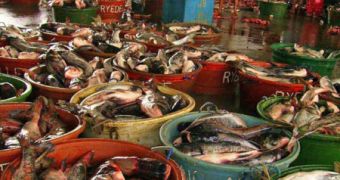The demands people have on the fish worldwide and the rate at which the fish can be harvested without endangering them are totally different things, researchers at the SINTEF Fisheries and Aquaculture say. According to their statistics, an average person today consumes about 15 kilograms (30 pounds) of fish per year. Considering that the global population is increasing quickly, SINTEF president Karl Andreas Almås predicts that the quantities of fish harvested on the globe will have to be increased twofold over the next 20 years.
The main concern in this regard is whether people will have the strength to increase the amount of fish they catch in a sustainable way. That is to say, overfishing is already taking a heavy toll on populations worldwide. Many fisheries simply exploit fish too much, and scientists already say that the situation in some areas is catastrophic. Almås says that there are two things humans must do in order to preserve the fish habitat and offer populations a chance to grow naturally. First of all, new harvesting techniques need to be set in place, so as to capture only the desired quality. Less developed fish should no longer have to be thrown out and wasted because it's useless.
The second thing that can be done is to increase the efficiency in the aquaculture sector, by reducing the amount of captured ocean fish that is being fed to farmed fish. Scientists draw attention to the fact that, between 1980 and 2030, fish consumption will rise by about 60 to 70 million tones. These figures are clearly unsustainable, and new ways of feeding farmed fish need to be employed. For instance, plant oils and proteins could be supplied in large enough quantity to secure a viable captive fish population.
In addition, growth economists also said that off-shore aquaculture could also be a viable option, especially around Norway, New Zealand or Australia. There are many advantages to this idea, including the fact that the water is much cleaner and has a more stable temperature. A challenge with this is that fish also suffer from "decompression" sickness, meaning that if the underwater cages are brought up too fast, they might implode. Scientists are currently looking at ways of lifting deep-water cages over a certain amount of time, so as to maximize the yield. Unfortunately, the technology is expected to be fully functional in about 10 to 15 years.

 14 DAY TRIAL //
14 DAY TRIAL //